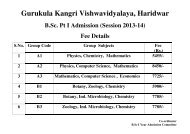B.A./Alankar – First Year
B.A./Alankar â First Year
B.A./Alankar â First Year
- No tags were found...
Create successful ePaper yourself
Turn your PDF publications into a flip-book with our unique Google optimized e-Paper software.
B.A./<strong>Alankar</strong> <strong>–</strong> <strong>First</strong> <strong>Year</strong><br />
Paper<strong>–</strong>I - Indian Logic<br />
Paper<strong>–</strong>II - Western Logic<br />
Second <strong>Year</strong><br />
Paper<strong>–</strong>I - Indian Epistemology and Metaphysics<br />
Paper<strong>–</strong>II - Western Epistemology and Metaphysics<br />
Paper<strong>–</strong>I - Indian Ethics<br />
Paper<strong>–</strong>II - Western Ethics<br />
Third <strong>Year</strong><br />
Paper<strong>–</strong>I<br />
Indian Logic<br />
UNIT <strong>–</strong> I : Meaning of Nyãya, Nyãya Darshana as Indian Logic, Main<br />
elements<br />
of the procedure of congnition :<strong>–</strong> Kathã,<br />
Vãda, Jalpa, Vitandã.<br />
UNIT <strong>–</strong> II : Meaning of Pramã¸a, Purpose and kinds, Perception and its<br />
kinds,<br />
Inference and its kinds, Verbal testimony,<br />
Shãbdabodha.
UNIT <strong>–</strong> III :<br />
Siddhãnta<br />
Nature of Prameyãs and their number, Classification of Prameyas,<br />
Concept of liberation, Nature and kinds of<br />
UNIT <strong>–</strong> IV : Nature and kinds of San¿aya, Hetu and Hetvãbhãsa, Nature and<br />
kinds<br />
of chhala.<br />
UNIT <strong>–</strong> V :<br />
Nature of Prayojana, DriÀhtãnta and its kinds, Natue of Nir¸aya.<br />
B.A./<strong>Alankar</strong> <strong>First</strong> <strong>Year</strong><br />
Paper<strong>–</strong>II<br />
Western Logic<br />
UNIT <strong>–</strong> I : Definition of Logic, Meaning of Yukti and it kinds, Concept of<br />
Truth and Validity.
UNIT <strong>–</strong> II : Definition of proposition, Difference between<br />
sentence and<br />
proposition, Contemporary analysis of<br />
proposition, Laws of thought.<br />
UNIT <strong>–</strong> III :<br />
Law<br />
Interpretation and importance of induction, Law of causation,<br />
of analogy of the nature, Contradiction of induction.<br />
UNIT <strong>–</strong> IV : Nature and importance of deduction, Symbolic logic, Symbols and<br />
their uses, Truth tables, Material<br />
implication, Venn diagram technique of<br />
testing the validity of syllogism.<br />
UNIT <strong>–</strong> V :<br />
Techniques of symbolization, Proof construction, Direct indirect<br />
and conditional proofs.<br />
Reference books:<br />
1- Introduction to Logic — Beson o' conner<br />
2- Introduction to Logic — Cohen & Negle<br />
3- Introduction to Logic — I.M. Copy<br />
4 - Six ways of Knowing - D.M. Datte<br />
B.A./<strong>Alankar</strong> Second <strong>Year</strong><br />
Paper<strong>–</strong>I
Indian Epistemology and Metaphysics<br />
UNIT <strong>–</strong> I : The nature of cognition, Kinds of Pramãña, Definition of<br />
Pramãña,<br />
Valid and invalid cognitions.<br />
UNIT <strong>–</strong> II :<br />
and<br />
UNIT <strong>–</strong> III :<br />
Sãmkhya<br />
Perception Inference, Comparision, Verbal Testimony, Arthãpatti<br />
Anupalabdhi.<br />
Prãmãnya: Origin and ascertainment as per Nyãya<br />
Buddhism and Meemãnsã.<br />
UNIT <strong>–</strong> IV : Categories:<strong>–</strong> Drvya, Guña, Karma, Sãmãnya, Vishesha,<br />
Samavãya and Abhãva, Nature of Sat, J¢va and<br />
Prakriti, The relation<br />
between Ishwara and the<br />
world.<br />
UNIT <strong>–</strong> V :<br />
Nature and kinds of siddhãnta, Definition of<br />
Nigrahasthãna, the nature of Vipratipatti.<br />
_______<br />
Prescribed Text:<br />
Refrence Books:<br />
Chatterjee<br />
Mãnmeyodaya <strong>–</strong> Narayan Bhatt<br />
1. The Nyãya Theory of knowledge - S.C. Chatterji<br />
2. Outlines of Indian Philosophy - M.Hiriyani<br />
3. An Introduction to Indian Philosohy - D.M. Datt &<br />
4. The Problems of Philosophy <strong>–</strong> B. Russell<br />
5. Metaphysics <strong>–</strong> W.M. Walsh
B.A./<strong>Alankar</strong><br />
Second <strong>Year</strong><br />
Paper<strong>–</strong>II<br />
Western Epistemology and Metaphysics<br />
UNIT <strong>–</strong> I : Knowledge : Definition and kinds, Uses of knowledge,<br />
Knowledge by acquaintance and knowledge by<br />
description.<br />
UNIT <strong>–</strong> II : Theories of truth: Correspondence, Coherence and<br />
pragmatism.<br />
UNIT <strong>–</strong> III : Nature of metaphysics : Philosophy and Science,<br />
Appearance and Reality, Substance, Causation,<br />
Universal, God, Proofs for<br />
the existence of<br />
God.<br />
UNIT <strong>–</strong> IV : Theories of knowledge: Rationalism, Empiricism and<br />
critical<br />
philosophy.<br />
UNIT <strong>–</strong> V :<br />
Method of doubt (Descartes), Scepticism of Hume, Truth, Belief,<br />
Justification, Foundationalism, Coherentism.<br />
_______<br />
References: 1. Problem of Philosophy — B. Russell<br />
2. Introduction to Philosophy — Polman<br />
3. Metaphysics — R. Taylor<br />
4. History of Philosophy — Thilley
B.A./<strong>Alankar</strong><br />
Third <strong>Year</strong><br />
Paper<strong>–</strong>I<br />
Indian Ethics<br />
UNIT <strong>–</strong> I : Definition of purushãrth, Four purushãrthas, Characteristics of<br />
Indian ethics, Varņashram <strong>–</strong> Vyavastha .<br />
UNIT <strong>–</strong> II : Vidhi, Nishedha, Dharma, Karma, Svadharma and Sãdhãr¸a<br />
Dharma.<br />
UNIT <strong>–</strong> III :<br />
UNIT <strong>–</strong> IV :<br />
UNIT <strong>–</strong> V :<br />
Bhakti,<br />
Four noble truths of Buddhists, Eightfold path,<br />
Yoga — Yama and Niyama.<br />
A¸uvrata, Mahãvrata and Triratna.<br />
The Bhagvdg¢t¡ Theories of Karma, Nishkãma Karma,<br />
Jñana, Vairagya, Sthitaprajnatã.<br />
_______<br />
References: 1. The Ethics of the Hindus — S.K. Maitra.<br />
2. Aspects of Hindu Morality — S. Jhingran<br />
3. The Indian Conception of Values — M. Hiriyana<br />
4. Ethical Philosophy of India — I.C. Sharma
B.A./<strong>Alankar</strong><br />
Third <strong>Year</strong><br />
Paper<strong>–</strong>II<br />
Western Ethics<br />
UNIT <strong>–</strong> I : Definition of Ethics, Nature and Scope, The Concept of Duty,<br />
Free will.<br />
UNIT <strong>–</strong> II :<br />
UNIT <strong>–</strong> III :<br />
Concept of Good and Evil, Right and Wrong, Ehical judgement.<br />
Hedonism, Utilitarianism, Egoism.<br />
UNIT <strong>–</strong> IV : Duties and Rights, Theories of punishment, Virtue ethics<br />
of<br />
Plato and Aristotle.<br />
UNIT <strong>–</strong> V :<br />
Intuitionism, Subjectivism, Objectivism, Descriptivism.<br />
_______<br />
Reference books:<br />
1. Principia Ethica — G..E. Moure<br />
2. Western Ethics — Mackenzie<br />
3. Five Types of ethical theories — C.D. Broad

















